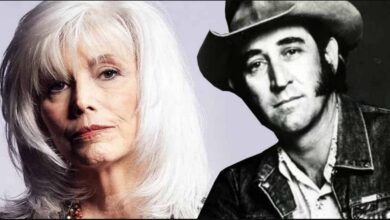“I Sang Dixie” By Dwight Yoakam, Incredibly Sad And Moving, A True Masterpiece
“Dwight Yoakam’s ‘I Sang Dixie’ stands as a poignant testament to the power of storytelling within country music. Released in 1988 as part of his album ‘Buenas Noches from a Lonely Room,’ the song resonates with a depth of emotion that transcends its melodic simplicity. At its core, ‘I Sang Dixie’ tells the tale of a down-and-out man who finds himself in the twilight of his life, reminiscing about a bygone era of Southern pride and resilience.
The song opens with haunting steel guitar strains, immediately setting a somber tone that persists throughout. As Yoakam’s rich, emotive vocals enter, listeners are drawn into the world of the protagonist, a man who has fallen on hard times and is left to ponder the fleeting nature of glory and identity. Through vivid lyrical imagery, Yoakam paints a portrait of a once-proud figure now reduced to begging for mercy on the unforgiving streets of Los Angeles.
What sets ‘I Sang Dixie’ apart from typical country ballads is its raw honesty and unflinching portrayal of human frailty. Yoakam’s delivery is marked by a palpable sense of vulnerability, as he embodies the character’s anguish and regret with unwavering conviction. Each verse unfolds like a chapter in a tragic novel, revealing new layers of depth and complexity to the protagonist’s journey.
One of the song’s most poignant moments comes in its chorus, where Yoakam reflects on the irony of singing ‘Dixie’—a symbol of Southern pride—while facing destitution in a distant land. It’s a stark reminder of the disconnect between the past and the present, as well as the universal struggle to reconcile one’s sense of self with the harsh realities of life.
Musically, ‘I Sang Dixie’ is a masterclass in restraint, with Yoakam and his band opting for a stripped-down arrangement that allows the lyrics to take center stage. The sparse instrumentation serves to underscore the song’s emotional weight, accentuating every ache and lamentation in Yoakam’s delivery.
Despite its melancholic subject matter, ‘I Sang Dixie’ ultimately offers a glimmer of redemption in its final verses. As the protagonist reflects on his own mortality, he finds solace in the knowledge that his voice—and by extension, his legacy—will endure long after he’s gone. It’s a bittersweet conclusion to a song that captures the essence of the human experience in all its beauty and tragedy.
In the grand tapestry of country music, ‘I Sang Dixie’ stands as a timeless classic—a testament to Dwight Yoakam’s prowess as both a songwriter and a storyteller. Its themes of loss, redemption, and the search for meaning resonate just as powerfully today as they did upon its release over three decades ago, cementing its status as a heart-wrenching masterpiece in the annals of American music.”
—
Dwight Yoakam, born in Pikeville, Kentucky, in 1956, emerged as one of the most distinctive voices in country music during the 1980s and beyond. With his trademark honky-tonk sound infused with elements of rockabilly and Americana, Yoakam carved out a niche for himself in an industry dominated by more polished and mainstream acts.
Growing up in Ohio and later moving to Los Angeles, Yoakam was exposed to a diverse array of musical influences, ranging from traditional country to rock and roll. This eclectic background would shape his unique musical style, characterized by twangy guitars, heartfelt lyrics, and a distinctive yodeling vocal delivery.
Yoakam’s breakthrough came with his debut album, “Guitars, Cadillacs, Etc., Etc.,” released in 1986. The album spawned several hit singles, including the title track and “Honky Tonk Man,” and catapulted Yoakam to stardom virtually overnight. His rebellious image and authentic approach to country music struck a chord with audiences, earning him a devoted following and critical acclaim.
Over the years, Yoakam has continued to push the boundaries of country music, experimenting with different genres and collaborating with artists from diverse backgrounds. His discography boasts a string of chart-topping albums and singles, including classics like “Streets of Bakersfield,” “A Thousand Miles from Nowhere,” and, of course, “I Sang Dixie.”
Beyond his musical achievements, Yoakam has also found success as an actor, appearing in a variety of films and television shows, including “Sling Blade,” “Panic Room,” and “The Three Burials of Melquiades Estrada.” Yet, it is his contributions to the world of country music that have solidified his legacy as one of the genre’s true icons.
With his unmistakable voice, unparalleled stage presence, and unwavering commitment to his craft, Dwight Yoakam continues to captivate audiences around the world, proving that true artistry knows no boundaries. Whether he’s crooning a heartfelt ballad or tearing through a raucous honky-tonk number, Yoakam remains a singular force in the ever-evolving landscape of American music.





